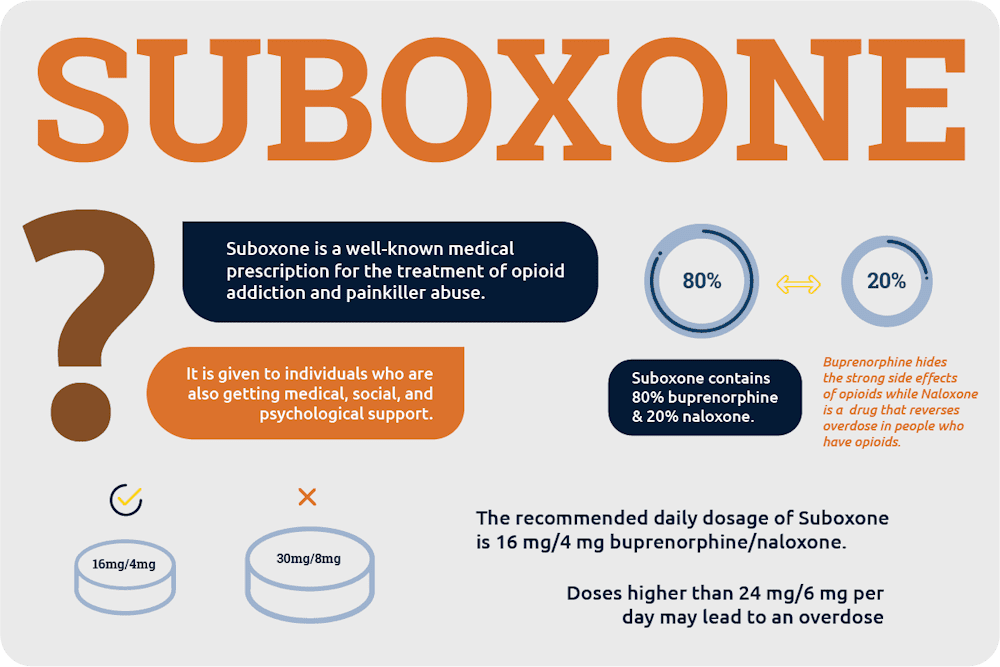Suboxone is considered a brand-name prescription that is utilized to treat opioid use disorder. It combines the two drugs naloxone and buprenorphine to help individuals struggling with opioid abuse and addiction overcome their physical dependence. Suboxone acts as a mild opioid medication that is utilized to treat mild pain, while naloxone will block the opioid receptors in a person’s brain and assist in preventing someone from experiencing a high if they take an opioid.
Can You Overdose on Suboxone?
 The short answer is yes, you can overdose on Suboxone. The recommended daily dosage of Suboxone is 16 mg/4 mg buprenorphine/naloxone. Doses higher than 24 mg/6 mg per day may lead to an overdose, so adherence to prescribed guidelines is crucial.
The short answer is yes, you can overdose on Suboxone. The recommended daily dosage of Suboxone is 16 mg/4 mg buprenorphine/naloxone. Doses higher than 24 mg/6 mg per day may lead to an overdose, so adherence to prescribed guidelines is crucial.
It’s important to know how to spot a Suboxone overdose. Even though both Suboxone and buprenorphine are highly effective at treating opioid addiction, it has great potential for abuse. As stated previously, when Suboxone isn’t taken properly, taken without a prescription, or taken at too high of a dose, the individual abusing Suboxone will most likely overdose.
Sometimes, individuals will decide to inject the drug, which allows them to detour the time-release qualities of the medication. Therefore, making the side effects and overdose more likely. When Suboxone is taken as prescribed, it doesn’t produce a euorophic effect.
Potential For Suboxone Misuse
If an individual takes too much of the drug at once, they might feel high and become addicted to it. Moreover, individuals who have a low opioid tolerance might undergo euphoria from a small dose of Suboxone. Similar to many other medications of abuse, when it is used in any other way than what it’s intended for on the label can increase the risk of overdose and addiction.
Since buprenorphine is a partial opioid, individuals who have overdosed on Suboxone will display similar signs to an opioid overdose. The early signs to keep an eye out for that might suggest a buprenorphine overdose includes the following:
- Reduced heart rate and breathing
- Blue colored fingernails and lips
- Difficulties concentrating
- Drowsiness and fatigue
- Nausea and vomiting
- Lack of coordination
- Slowed heartbeat
- Abdominal pain
- Slurred speech
- Pinpoint pupils
- Poor memory
- Blurry vision
- Confusion
- Seizures
What Is Suboxone?
 One of the drugs that are combined with Suboxone is buprenorphine, which is considered a long-acting partial opioid agonist, and the other drug naloxone temporarily reverses the overall effects of opioid drugs on the brain. Suboxone is utilized to treat individuals in recovery from opioid addiction, and it’s not considered a pain killer. Generally, doctors prescribe Suboxone for a specific period, gradually tapering off of the dose of the medicine.
One of the drugs that are combined with Suboxone is buprenorphine, which is considered a long-acting partial opioid agonist, and the other drug naloxone temporarily reverses the overall effects of opioid drugs on the brain. Suboxone is utilized to treat individuals in recovery from opioid addiction, and it’s not considered a pain killer. Generally, doctors prescribe Suboxone for a specific period, gradually tapering off of the dose of the medicine.
The process occurs until a person has achieved sobriety and can furthermore maintain their recovery from addiction. In 2002, buprenorphine was first approved by the Food and Drug Administration (FDA) as a new method for assisting individuals struggling with prescription or heroin narcotic addiction. A doctor will prescribe the medication and then gradually taper the patient off of it.
Tapering will continue until the individual’s body no longer relies on the narcotics to feel normal. The medication naloxone has been commended by various emergency responders and lawmakers because administering knocks the opioids that are causing the overdose. Overall, the opioids that cause the overdose to get knocked off the receptors of the brain, therefore temporarily reversing the overdose.
Even though the overall effect doesn’t last entirely long, it might be long enough for an individual to receive emergency medical attention. Once both drugs are combined, Suboxone is considered to be tamper-proof. Naloxone helps a great deal.
The Process of Suboxone
 When Suboxone is taken as directed, it releases Buphreophrine slowly into the individual’s body, easing withdrawal symptoms and cravings. If an individual attempt to detour the time-release parts of Suboxone, for example, by injecting the drug, they won’t feel a rush of Buphreophrine. Instead, the individuals will have a temporary block on opioid drugs that reaches the brain at all since naloxone binds to the opioid receptors.
When Suboxone is taken as directed, it releases Buphreophrine slowly into the individual’s body, easing withdrawal symptoms and cravings. If an individual attempt to detour the time-release parts of Suboxone, for example, by injecting the drug, they won’t feel a rush of Buphreophrine. Instead, the individuals will have a temporary block on opioid drugs that reaches the brain at all since naloxone binds to the opioid receptors.
The above-mentioned process will force the individual into withdrawal, which isn’t considered physically dangerous but can be extremely uncomfortable. Furthermore, individuals who don’t have a high opioid tolerance might still be able to undergo some euphoria by taking Suboxone, and some medications can interfere overall with the drug’s functioning. These types of problems can lead to an overdose, even though the drug contains naloxone.
What Are the Symptoms of Suboxone Overdose?
The symptoms of a Suboxone overdose are similar to the overdoses of various other opioid drugs. The majority of individuals who die due to a drug overdose usually die within the first one to three hours after ingesting a deadly amount of drugs. Seriously, loved ones can recognize early signs of an overdose before the person becomes unconscious.
An individual that has undergone a Suboxone overdose might experience the following:
- Loss of physical coordination and appearing drugged or drunk
- Difficulties remembering things or concentrating
- Slurred speech and lack of coordination
- Anxiety, irritability, and mood swings
- Extreme drowsiness and fatigue
- Blue-tinged fingernails and lips
- Confusion and dizziness
- Nausea and vomiting
- Depressed breathing
- Slowed heartbeat
- Abdominal pain
- Pinprick pupils
- Blurred vision
- Sleepiness
- Seizures
It’s essential to remember that opioid drugs are considered central nervous system depressants. When an individual takes a deadly amount of a central nervous system depressant, the body isn’t able to get enough oxygen into the bloodstream, and eventually, the breathing will stop. Once that occurs, the individual will become unconscious.
At the latter stages of a Suboxone overdose, the individuals can pass out. Therefore, becoming unresponsive. It can be a serious turn of events.
What Should You Do if You or Someone You Know Overdoses on Suboxone?
 The only way for an individual to survive a Suboxone overdose is through emergency medical attention. It’s important to note that even though administering naloxone will stop the overdose temporarily, it is still considered a half and short life compared to buprenorphine and will therefore wear off first. Once the naloxone wears off on an individual, the individual might experience continuous overdose symptoms.
The only way for an individual to survive a Suboxone overdose is through emergency medical attention. It’s important to note that even though administering naloxone will stop the overdose temporarily, it is still considered a half and short life compared to buprenorphine and will therefore wear off first. Once the naloxone wears off on an individual, the individual might experience continuous overdose symptoms.
If a person is wondering, “Can you overdose on Suboxone?”, the answer is yes. An individual can become addicted to the buprenorphine medication. Fortunately, we can help.
When individuals detox with the assistance of a medical professional, gaining social support from family and friends and attending a drug rehab in Illinois that includes therapy is the most effective path to overcoming the issue and getting healthy. In the United States, the opioid abuse epidemic is a huge problem. Therefore, various rehabilitation programs can provide needed care.
Underlying Addictions
Furthermore, it helps understand the compulsions that are underlying addiction. Ultimately, how to change the behaviors in response to triggers or stress is the goal. Prescription medications such as Suboxone are designed to assist the detoxification process, but it’s ideal to remember that they are not a solution to the addiction. Moreover, they can become the target of abuse.
Similar to prescription painkillers, Suboxone can become the target of abuse. Receiving professional care from a rehab program will assist a person in overcoming the psychological details of addiction. This process occurs after the individuals overcome their physical dependence on the drug.
Drug Interactions That Increase The Risk of Suboxone Overdose
Various drugs interact with Suboxone. When the drug interacts negatively with Suboxone, the chances of Suboxone overdose are increased.
Below are some of the medications:
- Benzodiazepines such as Valium, Klonopin, and Xanax
- Hormonal contraceptives
- Barbiturate drugs
- Antidepressants
- Phenobarbital
- Alcohol
What Is Suboxone Overdose Treatment?
There are various Suboxone overdose treatment options. Most likely, doctors will administer a narcotic antagonist, or even give the patient more of a mixture of activated laxatives and charcoal as a way to expel and absorb the drug toxins. When patients are in a hospital, patients who have overdosed are generally given intravenous fluids to further prevent dehydration.
Once the individual is stabilized and can no longer face a vital health emergency, the hospital staff might request that the patient undergo a MAT, medically assisted detox, and rehab. For individuals who are addicted to Suboxone, the replacement drugs for opioid addiction aren’t recommended anymore. Therefore, it cannot be used to assist an individual in recovery.
However, individuals can take medications in an attempt to help lessen the severity of the withdrawal symptoms while they undergo the detox process. Overall, the detox process can take numerous weeks before the patient is clean from the Suboxone. It is possible for an individual who has overdosed to experience detox through an IOP or a hospital.
The factors that will determine the most ideal course of action for an individual’s treatment and recovery are the following:
- The patient’s circumstances
- Recovery needs
- Medical history
After the individual completes the detox process, they are transitioned to an outpatient rehab program or inpatient rehab program. The patients will work with a therapist closely along with other drug abuse specialists to understand the following:
- How to maintain sobriety
- Causes of the addiction
- Triggers
- Roots
Suboxone Overdose Treatment at Northern Illinois Recovery
 Whether an individual is addicted to heroin, prescription opioids, or even Suboxone, they can be properly treated. We offer numerous levels of care all aimed at covering a full spectrum of various addiction treatment methods. Our goal is to provide our patients with the most ideal opportunity to create a healthy and fulfilling life.
Whether an individual is addicted to heroin, prescription opioids, or even Suboxone, they can be properly treated. We offer numerous levels of care all aimed at covering a full spectrum of various addiction treatment methods. Our goal is to provide our patients with the most ideal opportunity to create a healthy and fulfilling life.
Here at Northern Illinois, we also provide a combination of evidence-based therapies and treatments that provide consistent results to our patients. If you desire to make a healthy change in your life, feel free to reach out. We would love to help you.
https://www.ncbi.nlm.nih.gov/books/NBK143177/
https://nida.nih.gov/publications/drugfacts/naloxone
https://www.ncbi.nlm.nih.gov/pmc/articles/PMC3334287/
https://www.mass.gov/service-details/how-to-reverse-an-overdose
https://www.samhsa.gov/medication-assisted-treatment/medications-counseling-related-conditions/buprenorphine
https://www.health.harvard.edu/blog/5-myths-about-using-suboxone-to-treat-opiate-addiction-2018032014496
https://medicine.weill.cornell.edu/divisions-programs/public-health-programs/suboxone-program#:~:text=Suboxone%20is%20an%20effective%20medication,Suboxone%20or%20go%20through%20detoxification



